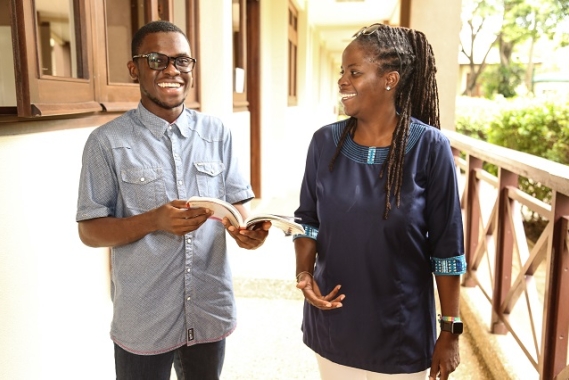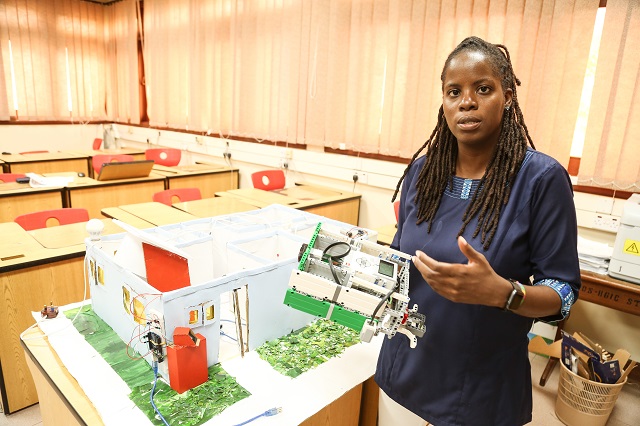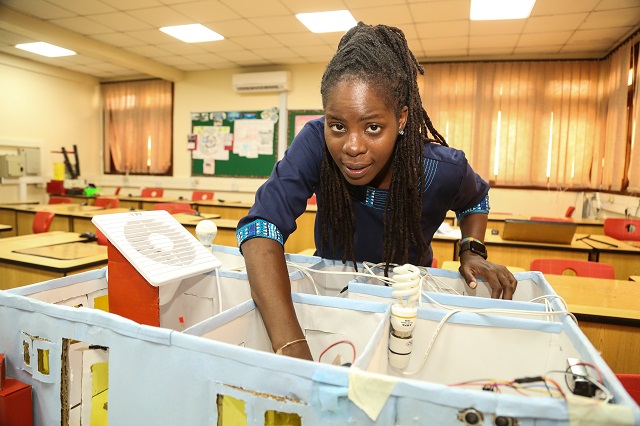Teaching by example: Mandy empowers girls in tech at SOS Children's Villages International College"

Mandy Ndoro, 32, has been a teacher at the revered SOS Children's Villages International College in Ghana for 6 years. As the department head of Information and Communications Technology (ICT), she is a role model for female students interested in succeeding in a field that is largely male-dominated. In this interview, Mandy talks about her childhood, love for technology, and how growing up in an SOS family in Zimbabwe awakened her greatest potential.
When and why did you join SOS Children’s Village in Zimbabwe?
I am the last-born in a family of four. My mother died after she gave birth to me. My relatives had children of their own, so it was a burden for them to take in all four of us. My father worked for a logistics company, driving cross-border routes in Southern Africa, including Eswatini (formerly known as Swaziland) and Zambia. About a year after my mother passed away, he died in a car accident. Until I was eight years old, I grew up at a local children’s home in Harare, Zimbabwe’s capital, and then I was placed in the care of an SOS Children's Villages in Zimbabwe.
How was your childhood?
Growing up in an SOS family has prepared me for a world that is constantly changing. I moved to SOS at the age of eight, then to Ghana at 14, and on to the United States to study at 19. I was placed in unknown environments several times, so I was mentally prepared for these changes. I have come to appreciate my upbringing, as it has contributed a lot to the successes I have had in my life - I am grateful.
Were you always a bright student, and did you want to attend SOS Children's Villages International College?
I heard people telling me I was bright but too playful. In grade seven, I started realizing that I had something in me that I could develop, but at this school, my biological sister was one of the first few Zimbabwean students to attend SOS Children's Villages International College. Seeing how she transitioned after coming here and what she was doing for herself inspired me to join the school as well. My older brother also came here, and that gave me continuous inspiration to be like them.

Apart from the motivation to become like your siblings, was there any other drive to excel, possibly something your SOS mother said or planted in you?
My SOS mother had to inform me that my sibling’s success is not my success. You have to create your own path. That is one of the things I still remember: that I have to create my own success, and they have to create theirs. She kept on reminding me of that when I left for Ghana.
Did you always know what you wanted to be when you grew up?
One thing I always loved was computers and technology, and this is something I developed when I was still at my SOS family in Zimbabwe. We had a small computer lab with about 5 or 6 computers, and some volunteers from the United Kingdom. The volunteers taught me tricks like booting the computer and logging in using MS-DOS, so my love for computers developed there. My love for computers continued when I came here.
How did your love for technology develop and turn into a career?
After my education at the SOS Children's Villages International College, I attended university in the US. I studied computer science and accounting as a double major. I worked at a bank and realized accounting wasn't what I wanted to do. Within the banking sector, I moved to the technology department, working on online banking systems. After that, I pursued my Master's in Management Information Systems. I worked with a third-party company that partnered with AT&T, supporting their telecommunications systems.
When an opportunity to head up ICT at the SOS Children's Villages International School came up, I did not go right away because I needed time to process the idea of coming back to where I was a student, probably meeting teachers who taught me and having to work with them. I eventually decided to come back after being in the US for 10 years, and I have never regretted it.
How has it been working here at the school, considering you were a former student?
I tend to work much harder to prove that I can do the job. I came in, started various initiatives, and my first computer science class was well received. The students found me very tough, but effective.
We now have more female students taking computer science than before. During my time, only boys took computer science. I am now seeing more girls develop a love for computing or STEM by actively engaging in STEM extracurricular activities or by actually opting to take computer lessons. The class graduating currently has 17 students, and I have 5 girls in it. It is not as big a number as I would like, but seeing those numbers increasing is definitely encouraging. Also, serving as a role model to female students who want to pursue computing is very encouraging, but a lot of pressure as well – it is still a work in progress.

You grew up in SOS, studied here, and are a teacher here; do you bring something different to the table compared to other teachers who have not experienced that?
I definitely bring a different dimension to the work I do. I can interact with the kids much more easily because I have a better understanding of where they are coming from and where they need to go. You realize that many students will automatically opt to have me mentor them and find it easier to discuss their plans, career aspirations, and personal challenges. It puts a lot of pressure on me because about 40% of the student population comes from different SOS families across Africa, and almost all of them look up to me. Then, it also makes my interactions in a classroom much easier. If a student is pulling away, I have a better sense of why they might be pulling away and what can bring them back. I share my personal story as a former student and a former sponsored child.
40% of the student population at this school is from SOS Children’s Villages in Africa. Does the college have an impact on the children who do not make it here?
I personally believe SOS Children's Villages International School is one of the brightest ideas ever developed. Not everyone has the opportunity to attend the school, but it has raised the standards and aspirations of students across SOS Children’s Villages in Africa. Seeing what someone who came to this school has achieved gives them hope and the aspiration to achieve the same.
Canadians wishing to help vulnerable children are encouraged to sponsor a child, sponsor a Village or make a one-time donation. Your support will change the lives of orphaned, abandoned and other vulnerable children. Please help today.
